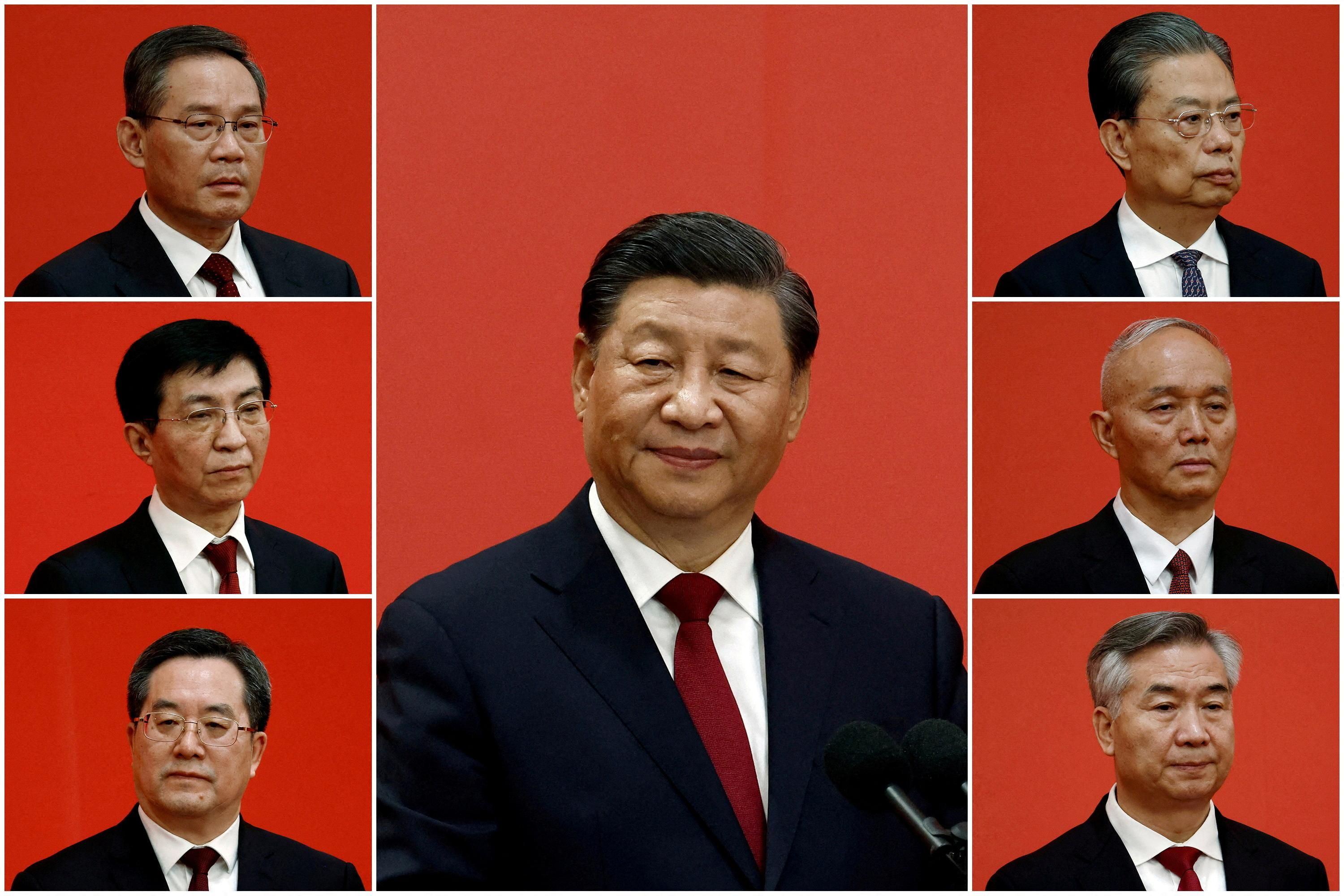What We’re Watching: Xi the all-powerful, Sunak the frontrunner, Shoigu the (nuclear) warmonger
All the secretary-general’s men
As expected, Xi Jinping was "re-elected" to a third term as secretary-general of China's ruling Communist Party on Sunday, a day after its 20th Congress wrapped up in Beijing. (The tightly scripted event had a bit of drama when his predecessor, Hu Jintao, was escorted out for “health reasons” as Xi looked on.) More importantly, the CCP unveiled its new seven-member Politburo Standing Committee, now made up entirely of Xi loyalists.
Who's in and who's out? The biggest name — other than Xi himself — is Shanghai party boss Li Qiang, who walked onto the red carpet in the Great Hall of the People right after Xi, which means he's now No. 2 in the CCP hierarchy and will likely be appointed premier in March. Li will replace current Premier Li Keqiang (no relation), who who retired before reaching the mandatory age of 70 and was removed from China's top decision-making body. Interestingly, Li Qiang was promoted by Xi despite having no nationwide executive experience and bungling Shanghai's COVID lockdown earlier this year. He’s been entrusted with running the economy at a time of the slowest growth China has seen for decades — in no small part due to Xi refusing to budge on zero-COVID.
What does this mean for Xi and for China? It's "a clean sweep for Xi allies and a consolidation of power unseen since the Mao era," tweeted Eurasia Group senior China analyst Neil Thomas. In other words, China's leader will be entirely surrounded by yes-men until the next party congress in 2027. On the one hand, that'll allow Xi to double down on policies that he thinks are ultimately good for China, such as "common prosperity" to make economic growth more equitable. On the other, Xi will be on the hook if things go south — as they famously did the last time China was under tight one-man rule.
Sunak leads race to replace Truss
Britain’s Conservatives are off to the races — again — this time to replace outgoing Prime Minister Liz Truss. Former Chancellor Rishi Sunak announced Sunday his second run for the top job and has already clinched the support of almost 180 MPs, well over the 100-MP threshold set by the Tories. In a last-minute twist, he won’t face off against his old boss Boris Johnson, after the ignominiously ousted PM unexpectedly dropped out of the race. Sunak’s only declared rival is now former defense chief Penny Mordaunt, who barely has 25 MPs supporting her but hopes some Johnson fans will switch to her side. Still, the UK seems to be going through its own It’s the economy, stupid moment of truth: ratings agency Moody’s downgraded Britain’s economic outlook from “stable” to “negative,” citing instability and high inflation. And in a rare show of bureaucratic discontent, Whitehall officials called out the upcoming spending cuts by Chancellor Jeremy Hunt — the UK’s fourth finance minister in as many months. The way things are going, there might be a fifth chancellor soon after Oct. 31, when Hunt delivers his “Halloween Speech” to unveil his new fiscal plan to the House of Commons — or is it the House of Horrors?
Is Russia playing “dirty”?
The lines of communication are open, but the topics are grim. On Friday and Sunday, for the first time since May, US Defense Secretary Lloyd Austin spoke with his Russian colleague Sergei Shoigu. Their topics of discussion were red lines and nukes, with the Biden administration seeking information on what might provoke a Russian nuclear attack in Ukraine. In weekend discussions with NATO counterparts, meanwhile, Shoigu flagged that Ukraine might be planning to use a “dirty bomb” — a conventional blast containing radioactive material. Russia’s state-owned news agency said the purpose would be to accuse Russia of using weapons of mass destruction and to turn the world against Moscow. The US National Security Council rejected the allegations as “transparently false.” Kyiv also pushed back, noting that it has no such weapons. “Russians often accuse others of what they plan themselves,” Ukrainian Foreign Minister Dmytro Kuleba said. President Volodymyr Zelensky warned that the allegations mean “Russia has already prepared all this” and encouraged the world to push back in the “toughest possible way.”This article comes to you from the Signal newsletter team of GZERO Media. Sign up today.
